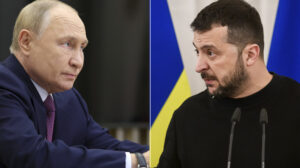“No nation has a weapon like ours,” says the Russian president about the Oreshnik missile, which he claims was successfully tested. Zelensky calls the use of another country’s territory to test weapons an “international crime.”
The war in Ukraine is entering a new phase, just over 1,000 days since Russia’s invasion.
Russia’s use of a medium-range missile—a combination of testing, demonstration, and operational deployment of an experimental weapon—has introduced new dynamics to the conflict. This comes after the U.S. and its allies authorized the use of weapons within Russian territory and adjusted their nuclear doctrine.
The use of Russia’s experimental missile to strike Ukrainian territory—reportedly almost impossible to intercept—carries symbolic significance, according to Paul Adams, diplomatic correspondent for the BBC. The physical damage to Ukrainian infrastructure, while real, is secondary and of uncertain severity.
The critical message from this missile launch is that it could also carry nuclear warheads if such a decision is made. This is a threat no one can take lightly.
Meanwhile, on Friday, Ukrainian President Volodymyr Zelensky announced that his country is working on developing new air defense systems to address “emerging threats” after Russia’s use of the new missile.
In a video message, Zelensky emphasized that Putin would continue his attempts to intimidate Ukraine, necessitating a “serious response.” He characterized the use of another country’s territory for testing new weapons as an “international crime” and vowed that the “Russian missile threat” would not be ignored.
To counter this, Ukraine is seeking to acquire the American Terminal High Altitude Area Defense (THAAD) system or upgrade its Patriot anti-ballistic missile defense systems, Interfax-Ukraine reported on Friday.
Sources from the Ukrainian General Staff confirmed ongoing negotiations with the U.S. regarding these systems, especially in light of Russia’s missile attack.
If there’s a glimmer of optimism for Ukraine, it’s the fact that, according to Ukrainian officials, the number of these experimental missiles is—at least for now—”very limited.”
Russia’s intentions, as outlined by Vladimir Putin in a statement on Friday, are clear.
The country will continue testing ballistic missiles of the Oreshnik type, which Putin claims was successfully launched on Thursday. Boasting about the missile’s capabilities, he stated, “No nation has a weapon like this.”
“There is no countermeasure to such a missile; it cannot be intercepted by any means in the world today,” the Russian president declared. He added that Russia has a stockpile of such systems ready for use and ordered the production of additional missiles.
The pressing question now is: “What will Vladimir Putin do next?”
Steve Rosenberg, the BBC’s Russia correspondent, attempts to answer this question but admits, “Honestly, I don’t know.”
Ask me anything
Explore related questions





